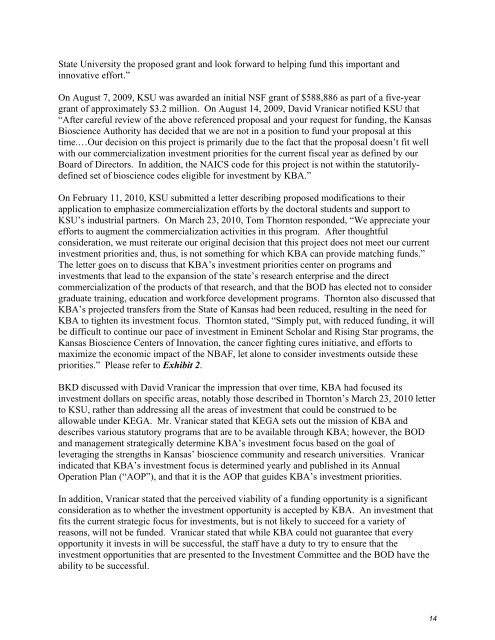Complete 2012 forensic audit documents - Kansas Bioscience ...
Complete 2012 forensic audit documents - Kansas Bioscience ...
Complete 2012 forensic audit documents - Kansas Bioscience ...
You also want an ePaper? Increase the reach of your titles
YUMPU automatically turns print PDFs into web optimized ePapers that Google loves.
State University the proposed grant and look forward to helping fund this important and<br />
innovative effort.”<br />
On August 7, 2009, KSU was awarded an initial NSF grant of $588,886 as part of a five-year<br />
grant of approximately $3.2 million. On August 14, 2009, David Vranicar notified KSU that<br />
“After careful review of the above referenced proposal and your request for funding, the <strong>Kansas</strong><br />
<strong>Bioscience</strong> Authority has decided that we are not in a position to fund your proposal at this<br />
time.…Our decision on this project is primarily due to the fact that the proposal doesn’t fit well<br />
with our commercialization investment priorities for the current fiscal year as defined by our<br />
Board of Directors. In addition, the NAICS code for this project is not within the statutorilydefined<br />
set of bioscience codes eligible for investment by KBA.”<br />
On February 11, 2010, KSU submitted a letter describing proposed modifications to their<br />
application to emphasize commercialization efforts by the doctoral students and support to<br />
KSU’s industrial partners. On March 23, 2010, Tom Thornton responded, “We appreciate your<br />
efforts to augment the commercialization activities in this program. After thoughtful<br />
consideration, we must reiterate our original decision that this project does not meet our current<br />
investment priorities and, thus, is not something for which KBA can provide matching funds.”<br />
The letter goes on to discuss that KBA’s investment priorities center on programs and<br />
investments that lead to the expansion of the state’s research enterprise and the direct<br />
commercialization of the products of that research, and that the BOD has elected not to consider<br />
graduate training, education and workforce development programs. Thornton also discussed that<br />
KBA’s projected transfers from the State of <strong>Kansas</strong> had been reduced, resulting in the need for<br />
KBA to tighten its investment focus. Thornton stated, “Simply put, with reduced funding, it will<br />
be difficult to continue our pace of investment in Eminent Scholar and Rising Star programs, the<br />
<strong>Kansas</strong> <strong>Bioscience</strong> Centers of Innovation, the cancer fighting cures initiative, and efforts to<br />
maximize the economic impact of the NBAF, let alone to consider investments outside these<br />
priorities.” Please refer to Exhibit 2.<br />
BKD discussed with David Vranicar the impression that over time, KBA had focused its<br />
investment dollars on specific areas, notably those described in Thornton’s March 23, 2010 letter<br />
to KSU, rather than addressing all the areas of investment that could be construed to be<br />
allowable under KEGA. Mr. Vranicar stated that KEGA sets out the mission of KBA and<br />
describes various statutory programs that are to be available through KBA; however, the BOD<br />
and management strategically determine KBA’s investment focus based on the goal of<br />
leveraging the strengths in <strong>Kansas</strong>’ bioscience community and research universities. Vranicar<br />
indicated that KBA’s investment focus is determined yearly and published in its Annual<br />
Operation Plan (“AOP”), and that it is the AOP that guides KBA’s investment priorities.<br />
In addition, Vranicar stated that the perceived viability of a funding opportunity is a significant<br />
consideration as to whether the investment opportunity is accepted by KBA. An investment that<br />
fits the current strategic focus for investments, but is not likely to succeed for a variety of<br />
reasons, will not be funded. Vranicar stated that while KBA could not guarantee that every<br />
opportunity it invests in will be successful, the staff have a duty to try to ensure that the<br />
investment opportunities that are presented to the Investment Committee and the BOD have the<br />
ability to be successful.<br />
14


